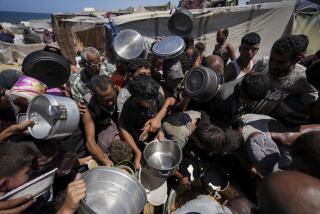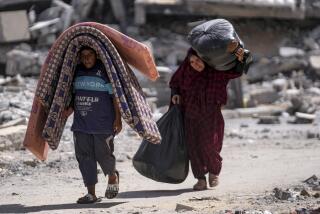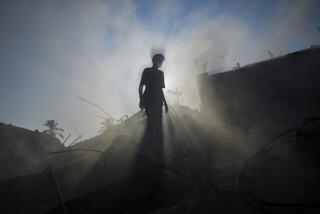NATO Threat of Air Strikes Met With Defiance : Bosnia: Bombardment shuts down Sarajevo airport, cutting off aid. Peace talks in jeopardy, Serbs warn.
ZAGREB, Croatia — Serbian nationalists who have laid siege to Bosnia-Herzegovina for 22 months reacted Tuesday to a NATO threat of air strikes by bombarding Sarajevo and warning that any move to stop them might scuttle paralyzed peace talks.
A mortar attack on the Bosnian capital’s airport shut down the vital food airlift on which Sarajevo’s 380,000 trapped residents depend. U.N. officials said they could not immediately determine which side in the ruthless struggle for the capital had fired those shots.
Relief flights to Sarajevo have been canceled for most of the past week because of intensified Serbian shelling of the densely populated city center and the airport, which is under U.N. control but unable to operate when under assault.
Tuesday’s shelling, however, was said by the U.N. commander in Sarajevo to have been provoked by an initial outgoing barrage by the Muslim-led government.
At a summit in Brussels, President Clinton and other leaders of the North Atlantic Treaty Organization renewed a 5-month-old threat to launch air strikes against Bosnian Serbs if they persist with the strangulation of Sarajevo and expanded the warning to include other besieged enclaves.
Bosnian Serb leader Radovan Karadzic showed defiance even before the NATO leaders worked out the final wording of their threat.
“If the anti-Serb resolution is adopted, it will not help the peace process but would jeopardize it,” Karadzic told the Bosnian Serb news agency SRNA from his mountain stronghold in Pale.
His nationalist followers kept up their artillery assault on Sarajevo throughout the day, which the commander of U.N. forces in Bosnia, Belgian Gen. Francis Briquemont, said was instigated by government shelling.
At least nine people were killed in the artillery exchange.
Bosnian Serbs, Croats and the government have been engaged in Western-mediated peace talks for 17 months and are scheduled to resume the costly peripatetic meetings in Geneva next Tuesday.
Karadzic, who was blamed by leaders of the European Union (formerly the European Community) for blocking progress at the last negotiating session in Brussels just before Christmas, underscored his warning against the NATO declaration by saying it “would prompt us to reconsider land concessions offered to the Muslims.”
Under the mediation of EU envoy Lord Owen and his U.N. counterpart, Thorvald Stoltenberg, Karadzic and the Bosnian Croat leader, Mate Boban, have drafted a plan for dividing Bosnia into three ethnic ministates, with half of the republic going to the Serbs, about 17% to Boban’s forces and one-third destined to remain under Bosnian government rule.
Although Karadzic’s rebels have yet to withdraw from any of the territory they have agreed to cede to rump Bosnia in exchange for capitulation, his comments to SRNA suggested even less of the occupied land would now be on offer at the peace talks.
NATO’s warning, which includes possible air strikes in the besieged eastern towns of Tuzla and Srebrenica, was also aimed at pressuring the Serbs to comply with deployment and aid delivery plans of the U.N. Protection Force, which has been thwarted in its effort to rotate fresh peacekeeping troops into Srebrenica.
UNPROFOR has also made little progress in getting Serbian compliance with plans to open Tuzla airport, which the Office of the U.N. High Commissioner for Refugees needs as a staging ground for relief missions.
Serbian obstacles put up in the east and fighting between Croats and Muslims in central Bosnia have blocked aid convoys.
The U.N. relief agency has expanded the amount of food airdropped to starving and isolated Muslim communities because of difficulties in transporting the crucial supplies by road, said UNHCR spokeswoman Alemka Lysinski.
The Reaction in Bosnia: More Bullets
The action taken Tuesday on Bosnia-Herzegovina, which is undergoing the worst fighting in Europe since World War II.
THE ANNOUNCEMENT
NATO leaders extended the threat of air strikes against Bosnian Serbs to try to force open a key airport and relieve a besieged U.N. peacekeeping unit.
THE U.N. REACTION
U.N. Secretary-General Boutros Boutros-Ghali “welcomed the political will expressed in the final communique of the Brussels summit, which will strengthen the U.N. role and actions in favor of peace,” his spokeswoman said.
THE REACTION ON THE FRONT LINES
Warring factions continued to shell Sarajevo, halting relief flights into the city just hours after they had resumed, and Muslim-Croat fighting raged in central Bosnia.
AIR STRIKES WOULD BE USED . . .
1. To force open a key airport for relief flights (Tuzla)
2. Relieve a trapped Canadian peacekeeping unit (Srebrenica)
THE “SAFE AREAS”
Six mainly Muslim enclaves were designated by the United Nations last year as “safe areas” to be protected. They are currently encircled by Serb artillery and cut off from each other. The six areas: Sarajevo, Tuzla, Bihac, Srebrenica, Zepa and Gorazde.
BACKGROUND
Serbian rebels bent on taking territory for a Greater Serbia have conquered 70% of Bosnia. Croatian nationalists--partly inspired by the Serbs’ unsanctioned land grab--have firmed up control over most of the rest. The toll: 200,000 Bosnians dead and more than 2 million homeless. American policy precludes stationing U.S. troops in the former Yugoslavia. But the Clinton Administration has offered to supply up to 25,000 American forces to police a ceasefire in the currently unlikely event of a peace settlement.
More to Read
Sign up for Essential California
The most important California stories and recommendations in your inbox every morning.
You may occasionally receive promotional content from the Los Angeles Times.











